Tennessee’s Attractive Incentives for Solar Power Adoption
In Tennessee, the cost of installing a solar energy system averages $20,916, which is notably higher than the national average of $16,715. Despite this, Tennessee residents can still find solar energy an attractive option, thanks to various incentives, including a property tax break that helps offset some of the initial costs.
The primary incentive for going solar in Tennessee is the federal solar investment tax credit (ITC). This significant financial incentive plays a crucial role in making solar energy systems more affordable for homeowners. Under the current policy, if you install a residential solar panel system by the end of 2032, you are eligible for a federal income tax credit amounting to 30% of the total cost of your system. This includes all expenses related to equipment, labor, and permits.
To put this into perspective, consider the average cost of a solar system in Tennessee, which is $29,880. With the federal ITC, you could be eligible for a tax credit of $8,964. This substantial credit can significantly reduce the financial burden of transitioning to solar power.
It’s important to understand that the solar tax credit is not a direct rebate or refund. Instead, it is claimed as a part of your federal tax filing in the year your solar panel system becomes operational. To claim this credit, you must complete IRS Form 5695. It’s also worth noting that the ITC is a nonrefundable credit, meaning it can reduce your tax liability but won’t result in a refund check. However, if you don’t use the entire credit amount in one tax year, it can be rolled over into the next year, providing additional financial flexibility.
In addition to the federal ITC, Tennessee offers a property tax break for solar installations. This incentive is designed to encourage homeowners to invest in solar energy by reducing the additional property tax burden that a new solar system might incur. By taking advantage of this tax break, homeowners can further mitigate the costs associated with their solar energy systems.
Despite the higher initial costs in Tennessee compared to the national average, these incentives make solar energy a viable and financially attractive option for many residents. The combination of the federal tax credit and the state’s property tax break helps to lower the overall investment required for solar installations, making it a more accessible and appealing energy alternative.
In summary, while the upfront cost of going solar in Tennessee may be higher than in some other states, the available incentives, including the federal ITC and property tax breaks, significantly reduce the financial impact. These incentives not only make solar energy more affordable for Tennessee residents but also contribute to the state’s broader environmental goals by encouraging the adoption of clean, renewable energy sources.






